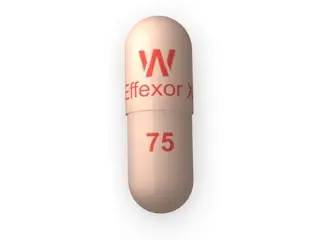| Package | Dosage | Price | Price per Dose | |
|---|---|---|---|---|
| Dosage: 37,5mg | ||||
| 360 pill | 37,5mg | AUD575.77 | AUD1.60 | |
| 240 pill | 37,5mg | AUD421.96 | AUD1.75 | |
| 180 pill | 37,5mg | AUD337.17 | AUD1.87 | |
| 120 pill | 37,5mg | AUD236.61 | AUD1.97 | |
| 90 pill | 37,5mg | AUD199.14 | AUD2.21 | |
| 60 pill | 37,5mg | AUD155.76 | AUD2.60 | |
| 30 pill | 37,5mg | AUD88.71 | AUD2.96 | |
| Dosage: 75mg | ||||
| 360 pill | 75mg | AUD879.44 | AUD2.45 | |
| 240 pill | 75mg | AUD605.35 | AUD2.52 | |
| 180 pill | 75mg | AUD479.15 | AUD2.66 | |
| 120 pill | 75mg | AUD356.89 | AUD2.98 | |
| 90 pill | 75mg | AUD285.90 | AUD3.17 | |
| 60 pill | 75mg | AUD207.03 | AUD3.45 | |
| 30 pill | 75mg | AUD118.29 | AUD3.94 | |
| 10 pill | 75mg | AUD47.31 | AUD4.73 | |

Venlafaxine Description
Introduction to Venlafaxine
Venlafaxine is a widely prescribed medication primarily used to treat depression and various anxiety disorders. It belongs to the class of drugs known as serotonin-norepinephrine reuptake inhibitors (SNRIs). This classification means it influences the levels of certain chemicals in the brain, helping to improve mood and reduce anxiety. Since its introduction to the market, Venlafaxine has gained recognition for its effectiveness and relatively quick onset of action.
How Does Venlafaxine Work?
Venlafaxine works by increasing the amounts of serotonin and norepinephrine in the brain. These are neurotransmitters that have a significant role in regulating mood, emotions, and pain perception. By preventing the reuptake of these chemicals back into nerve cells, Venlafaxine enhances their availability in the brain. This mechanism helps to restore the balance of brain chemistry, alleviating symptoms of depression and anxiety disorders.
Usage and Dosage
The medication is usually prescribed in gradual doses, starting with a low amount to minimize side effects. Depending on the patient's condition and response, the dose can be increased over time. It is important to follow the healthcare provider’s instructions carefully. Venlafaxine is typically taken once or twice daily with food to reduce gastrointestinal discomfort. Consistency is crucial for its effectiveness, and patients should not suddenly stop taking the medication without consulting their doctor.
Potential Benefits
Patients often report significant improvements in mood, energy levels, and overall mental well-being after using Venlafaxine. It is known to be effective in treating major depressive disorder, generalized anxiety disorder, social anxiety disorder, and panic disorder. Many find it helpful in reducing the frequency and intensity of anxiety attacks. Additionally, some patients experience an improvement in sleep patterns and a reduction in physical symptoms associated with depression, such as fatigue and stress.
Possible Side Effects and Risks
Like all medications, Venlafaxine can cause side effects. Some of the most common include nausea, dizziness, dry mouth, loss of appetite, and sweating. Less frequently, patients may experience increased blood pressure, headache, or gastrointestinal disturbances. It is essential to monitor health regularly and report any unusual symptoms to a healthcare professional. There is also a risk of withdrawal symptoms if the medication is discontinued abruptly. Therefore, a gradual reduction in dosage is recommended under medical supervision.
Precautions and Interactions
Patients should inform their doctor about any other medications they are taking, including over-the-counter drugs and herbal supplements. Venlafaxine can interact with other substances, increasing the risk of serotonin syndrome or other adverse effects. Individuals with a history of hypertension, bleeding disorders, or liver problems should use Venlafaxine with caution. Pregnant and breastfeeding women must discuss the potential risks and benefits with their healthcare provider. Regular medical check-ups are vital to ensure the safe and effective use of the medication.
Conclusion
Venlafaxine remains a popular and effective choice for managing depression and anxiety-related conditions. Its ability to influence serotonin and norepinephrine levels in the brain contributes to its therapeutic benefits. While it offers hope for many patients, awareness of potential side effects and adherence to medical advice are essential. Proper supervision can help maximize its positive effects while minimizing risks, leading to improved quality of life for those affected by mental health conditions.


